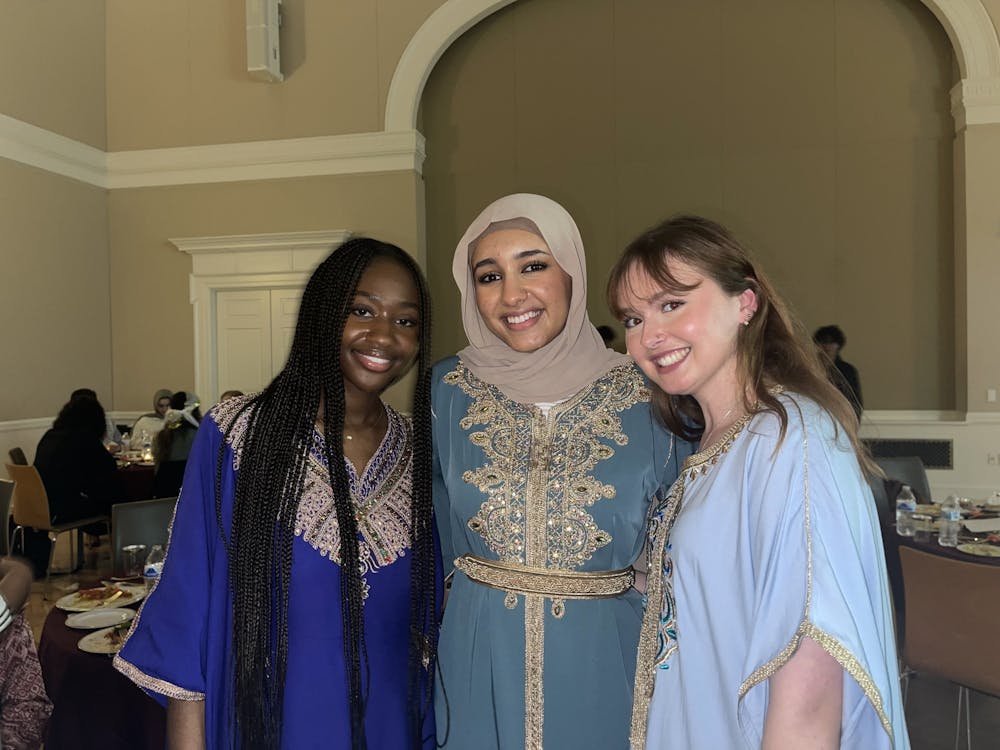Ambient candlelight and whispers of delight filled Newcomb Ballroom Sunday as students gathered for the Arab Student Organization’s biggest event of the year — Layaleena. An Arabic word that translates to “Our Nights,” Layaleena is a formal celebration of Arab culture that showcases connections between ethnic traditions within the Arab world.
The event included a skit written and performed by first-year members, a poem, dances and a song. More than 150 guests dined in the decorated ballroom, marking Layaleena’s largest showing since the pandemic. Aiming to highlight the nuances that make Arab culture unified yet unique, ASO incorporated aspects of Egyptian, Palestinian, Moroccan, Syrian, Lebanese, Iraqi and Sudanese culture into the event.
For Jenine Hamdan, president of the ASO executive board and fourth-year College student, each element of Layleena was meant to expose students to the diverse Arab community on Grounds.
“It's an event to highlight and spotlight our culture through performances led by students such as skits,” Hamdan said, “We also have dance performances such as Dabke which holds very high cultural significance in the Arab world. The highlight of the night is usually a catered Arab dinner.”
Attendees dressed in cultural or formal attire, many wearing traditional celebratory outfits from their home countries. Across the ballroom, many non-Arab students in attendance wore Arab clothing they borrowed from friends, enjoying the chance to wear something new. Hamdan emphasized that Layaleena, like every other ASO event, was open to all students regardless of their background.
“I think it's important to note also that [ASO is] not just for Arab students,” Hamdan said. “It's also for those who are interested in learning more about the culture and the language. We have multiple members who are not Arab. Some are in Arabic classes and some are not, they're just interested in the culture.”
According to Hamdan, events like Layaleena can transform students’ awareness of the Arab community on Grounds and around the world. As Arabs are often portrayed in the media in contexts of war and turmoil, one of ASO’s goals with Layaleena is to humanize the language, culture and tradition of Arab people, who are misunderstood under the guise of conflict.
“I think it's important for people to see that there is this Arab community here on Grounds and ... to increase people's interactions with our students,” Hamdan said. “So that, you know, the only Arabs they see are not [just] the ones they see in the news. Having personal relationships with them definitely, I think, gives you a better understanding.”
In one performance, students presented a dialect skit that juxtaposed an Arabic speaker from the United States — who spoke Modern Standard Arabic, the academic dialect of the language — with Arabic speakers who spoke the native dialects of 10 different countries. According to Sarah Tomeh, ASO social outreach chair and third-year College student, the performance aimed to highlight the complexity of Arabic dialects, which are characterized by a variety of accents and colloquial styles.
“The dialect skit was a really big one that we don't do every year, but this year, part of the reason why we did it and part of the reason why it's so important tonight, is because it really showcases how diverse the Arab diaspora is,” Tomeh said.
Fourth-year College student Liam Brennan played the Modern Standard Arabic speaker in the dialect skit. Given his background as a non-native Arabic speaker, Brennan explained how presenting his character represented a newfound closeness to Arab culture, especially compared to last year’s Layaleena when he attended as a guest.
“Now, with my involvement in ASO, I'm very humbled and grateful that I've gone from sitting in the corner at [my] first Layaleena to being center stage at the second,” Brennan said.
The finale of the program was the traditional Dabke performance, a group Palestinian step dance that was choreographed and brought to life entirely by the performers themselves. According to Tomeh, a group of interested ASO members spent weeks in advance of the event rehearsing and developing the number.
“Palestinian Dabke, that was the highlight, you know, in light of everything that's happening,” Tomeh said of the performance. “We're always honoring our culture, always honoring our identity, even though we are thousands of miles away, we're bringing that to the campus.”
Layaleena created a sense of nostalgia, belonging and community for all attendees regardless of their background. For fourth-year College student Sanjida Sajjad, who doesn’t go to all of the ASO events and does not speak Arab, the event gave her a deeper appreciation of Arab culture. She left the event with one feeling in mind — connection.
“[Layaleena] creates connections,” Sajjad said. “I feel like ASO does a good job at that, and I can see that their executive board is very close, and they translate that to the rest of us.”







